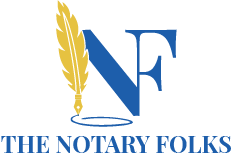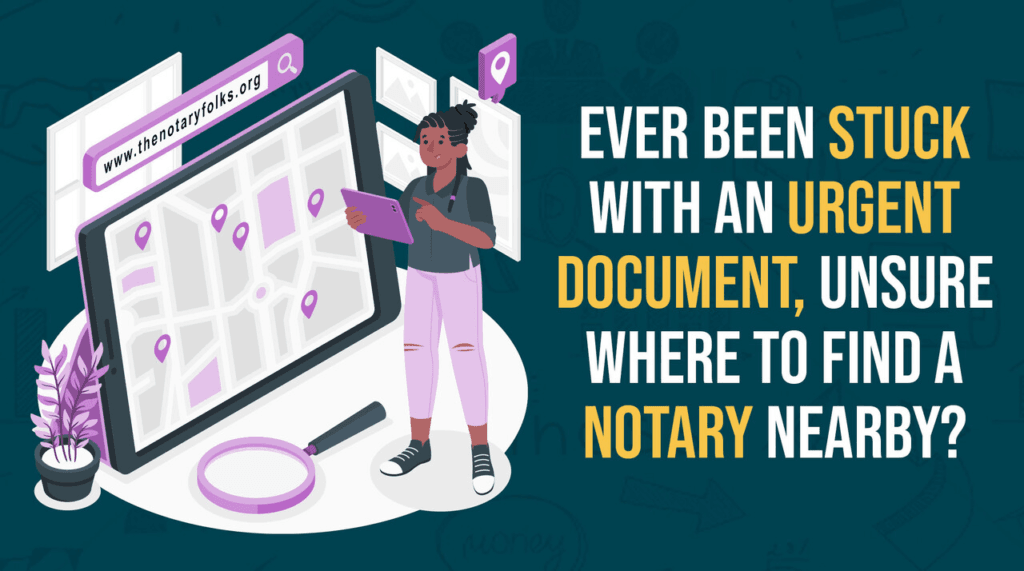
In today’s fast-paced, digital world, the demand for efficient and accessible notary services is skyrocketing. That’s why The Notary Folks offer remote online notarization, eliminating the need for time-consuming in-person appointments. And the best part? Our services extend beyond borders! If you need a document notarized internationally, we can help. Check out our guide to learn more: “How to Hire an International Online Notary.“
What is a Remote Notary?
A remote notary, also known as an online notary or e-notary, is a certified notary public who is authorized to perform notarial acts remotely using secure audio-visual technology. This allows the notary and the signer to complete the notarization process without being physically present in the same location. Now, you might be wondering how this differs from a mobile notary. It’s a great question, and we’ve outlined the key distinctions in our blog post: “Remote Notary vs. Mobile Notary: Understand the Differences and Pick the Right One for You”.
The Benefits of Using a Remote Notary
Convenience and Flexibility
One of the primary advantages of a remote notary is the convenience and flexibility it offers. With a remote notary, you can have documents notarized from the comfort of your own home or office, without the need to schedule an in-person appointment or travel to a physical notary location. This is especially beneficial for individuals with busy schedules, limited mobility, or those who live in remote areas.
Increased Accessibility
Remote notary services help to bridge the gap for individuals who may have difficulty accessing traditional notary services. This includes people with disabilities, the elderly, or those who live in rural or underserved communities. By offering a remote option, these individuals can still obtain the necessary notarizations without the added challenges of in-person visits.
Enhanced Security
Remote notarization leverages advanced technologies to ensure the highest levels of security and fraud prevention. During the process, the notary uses secure video conferencing to verify the signer’s identity, observe the signing, and apply their digital seal and signature. This helps to minimize the risk of identity theft, forgery, or other forms of document tampering.
Faster Turnaround Times
With remote notary services, the entire process can often be completed in a matter of minutes, rather than the hours or days that may be required for traditional in-person notarization. This makes it an ideal solution for time-sensitive documents or situations where a quick turnaround is necessary.
Cost Savings
Utilizing a remote notary can also result in significant cost savings compared to traditional in-person notarization. Eliminating the need for travel, parking, and potentially missing work can all contribute to the overall financial benefits of using a remote service.
What Can Be Notarized Remotely?
Remote notary services can be used for a wide range of legal and financial documents, including:
- Affidavits
- Powers of Attorney
- Deeds and real estate documents
- Wills and trusts
- Loan agreements
- Contracts and business documents
- Consent forms
- Sworn statements
It’s important to note that the specific types of documents that can be notarized remotely may vary by state or jurisdiction, as some states have different laws and regulations regarding remote notarization.
The Remote Notarization Process
The remote notarization process typically involves the following steps:
- Identify the Notary: Many remote notary services have online directories or platforms that allow you to easily find and connect with a qualified notary.
- Schedule an Appointment: Once you’ve identified a remote notary, you’ll need to schedule a virtual appointment. This can often be done online or by phone, and the notary will provide you with the necessary login information and instructions.
Prepare the Documents: Before your appointment, ensure that the documents you need to have notarized are ready and accessible. You may also need to have a valid government-issued ID, such as a driver’s license or passport, available to present to the notary.
- Video Conference with the Notary: During the scheduled appointment, you’ll connect with the remote notary via a secure video conferencing platform. The notary will guide you through the process of verifying your identity and signing the documents electronically.
- Completion and Delivery: Once the documents have been signed and notarized, the notary will apply their digital seal and signature. The completed, notarized documents will then be electronically delivered to you.
What to Expect During the Remote Notarization Process
When using a remote notary service, you can expect the following:
Identity Verification: The remote notary will use the video conferencing platform to carefully verify your identity by examining your government-issued ID and comparing the details to your physical appearance.
Signing the Documents: You’ll be instructed to review the documents and sign them electronically while the notary observes the process via the video feed.
Digital Notarization: The notary will apply their digital seal and signature to the documents, completing the notarization process.
Secure Document Delivery: The notarized documents will be securely delivered to you electronically, often via email or a secure file-sharing platform.
Ongoing Support: The remote notary service may provide additional support or guidance throughout the process, answering any questions you may have.
The Legalities of Remote Notarization
The legality of remote notarization has been a topic of discussion in recent years, as the technology has become more widely adopted. However, many states have now passed laws and regulations that specifically address and authorize the use of remote notary services.
In the United States, the Uniform Law Commission (ULC) has developed the Revised Uniform Law on Notarial Acts (RULONA), which provides a legal framework for remote notarization. As of 2023, over 30 states have adopted RULONA or enacted their own laws to allow for remote notarization.
It’s important to note that the specific legal requirements for remote notarization may vary by state or jurisdiction. Before using a remote notary service, it’s recommended to research the applicable laws and regulations in your area to ensure that the remote notarization process will be legally recognized and accepted.
Conclusion
Remote notary services offer a modern, convenient, and secure solution for individuals and businesses who need documents notarized. By eliminating the need for in-person visits and providing greater accessibility, remote notarization has become an increasingly popular option in today’s digital landscape.
Whether you need to notarize a contract, power of attorney, or any other legal document, a remote notary can provide a streamlined and efficient process that saves you time, money, and hassle. By understanding the benefits, process, and legal considerations of remote notarization, you can confidently take advantage of this innovative service and enjoy the peace of mind that comes with having your important documents properly notarized.


